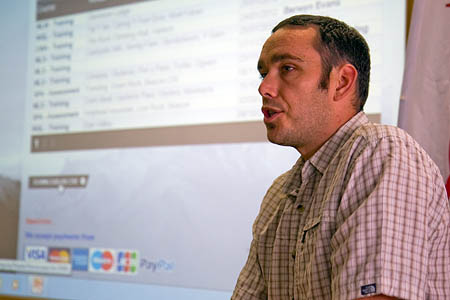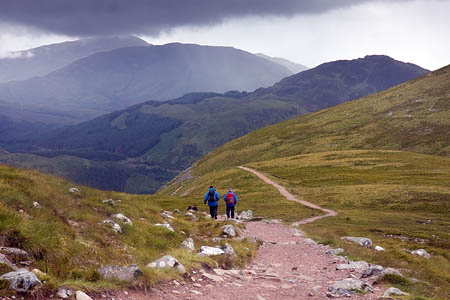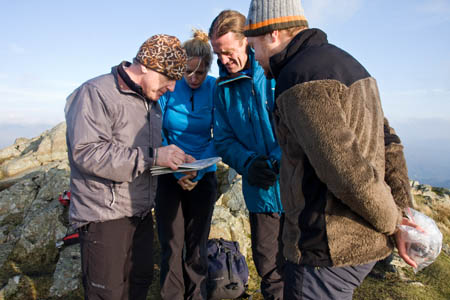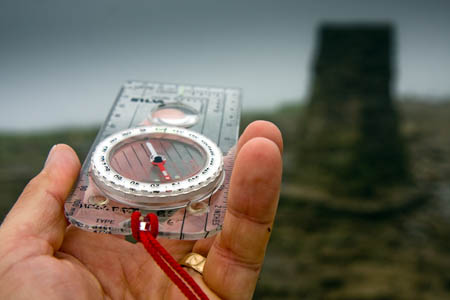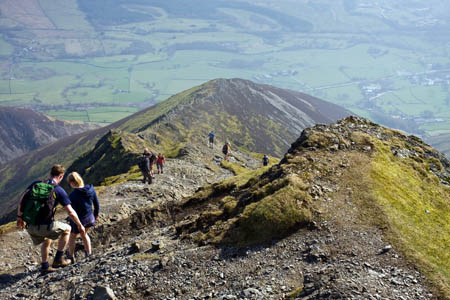
The Mountain Training courses will be aimed at members of the public who have no interest in leading
The organisation that has overseen the training of thousands of mountain leaders now wants to widen its remit and start educating Joe Public about how to stay safer in the hills of the UK.
More than 200,000 people have been on the books of the various leader training schemes since the Mountain Leader Training Board was set up in 1964 and currently about 6,000 register each year for awards such as Mountain Leader, Walking Group Leader and the Single Pitch Award.
The purpose of these awards is to ensure men and women who lead groups in the hazardous terrain of the UK’s and Ireland’s uplands are up to scratch.
The courses are demanding and set a high standard. For instance, to become a qualified Mountain Leader, a candidate has to demonstrate prior experience, undertake six days’ on-the-hill training, complete at least 40 separate days on mountains in various areas, then submit to a further five-day assessment course on the hills. Only if he or she satisfies course directors will the coveted ‘pass’ sticker go in the logbook.
But with a growing number of walkers heading for the hills, many with little formal knowledge of hill skills, the training bodies of the UK have decided it’s time to educate the masses about walking in Britain.
At Plas y Brenin, the National Mountain Centre in Snowdonia, the main shakers in Britain’s mountain training movement explained why the ‘leader’ has been dropped from its title and it has now become simply Mountain Training.
Bryn Williams is the chief executive of Mountain Training Cymru, the Welsh arm of the organisation, and he has been working at devising two ‘non-leader’ schemes for the past year.
He outlined the plans which, though not complete, are at an advanced stage.
The lower-level course will be called hill skills. “That’s an introductory skills course for people who want to get into country walking, so not mountains – more countryside walking,” he said.
It would be aimed at walkers using the type of countryside covered by the Walking Group Leader Award: moorland, upland, fells and bog.
Mr Williams said: “The mountain skills would be for much more rocky, jagged, high peaks and that would equate to the same remit areas as the Summer Mountain Leader.”
There will be no element of leading in either course.
“It will be totally personal skills,” he said. “There will be no formal assessment or measure of competence from the course. It’s an attendance course. But there will still be a registration process with mountain training, so we can help engage those users into a pathway, hopefully for the future.”
He thinks some will go on to leadership courses after taking one of the skills training schemes.
Mr Williams said: “One of our common questions we get regularly now is about how people gain the experience to then go on to the leadership awards.
“So it’s about instilling best practice from an early stage.
“We would never make it a mandatory part of going through a leadership award. What we see this as, is mountain training putting skills out there to Joe Public.”
Another difference is that some teenagers who are barred from leadership courses will be able to tackle one of the skills courses. “The lower age limit will be 14, though there’s a chance it could go lower. It’s that key age we hope to engage with,” he said. The leaders’ courses don’t allow candidates under the age of 18.
Many mountain rescue teams will tell you a big factor in their callouts is the fact that many hill-goers simply don’t have the knowledge, skills and experience to find their way around safely on the UK’s uplands.
Mountain Training is hoping that by encouraging members of the public on to its two courses, there will be fewer instances of walkers calling for help. Mr Williams, himself a member of the Llanberis Mountain Rescue Team, said: “This is really interesting to mountain rescue as well. It’s something they want to endorse because currently there’s no personal scheme or certified course that isn’t assessed that is recognised nationally.
“It would increase knowledge in the mountains without a formal assessment.”
He envisages the hill and mountain skills courses being delivered by those who already hold leadership awards and have the necessary experience. So existing leaders may see an additional business opportunity to take walkers into the hills.
“The plans for content are at a draft stage at the moment,” he said. “They look to be two-day courses each and the way they will be delivered is through our award holders.
“For hillwalking, it will be through experienced WGL holders and for mountain skills it will be experienced ML holders.
“There are certain criteria they will have to fulfil to apply to be a tutor. And that will be holding the award; gaining further experience once they have got that award; some update training so we can teach them how to coach and train others because we want the skills to be passed across in a very clear and precise manner, and then an update and revalidation every few years.
“So it will be quite heavily quality assured as well.”
The courses will include things such as navigation; weather; preparation; equipment; emergency procedures; route choice.
The Mountain Training Cymru chief executive said: “We’ve just got the unofficial wink for funding from Sport England for this development to start in April, so hopefully, this year we will actually roll it out.
“I’ve been scheming away at it for a year. We’ve got blueprints; now we just need to do the implementation.
“We need to set up our induction workshops; make sure we’ve got the people to deliver the course. But the biggest challenge we’re going to face is making sure the public know this exists as an option for them and that’s where we really need to make sure we market ourselves well.”
Those who undertake the courses will get a handbook and as part of the handbook they will get a trimmed-down version of Steve Long’s Hillwalking book, which is the official handbook for candidates on WGL and ML courses.
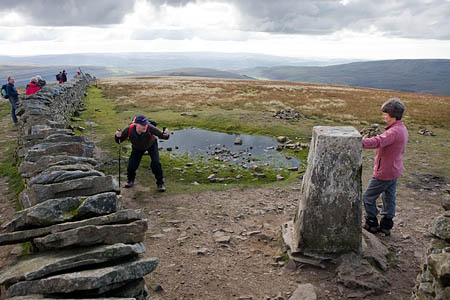
There has been an increase in recent years in the number of Britons heading for the country's hill-tops
“That will be used as a reference for them, something they can take along to the course and associate with where they’re up to,” Mr Williams said.
“They will also get a certificate of attendance at the end of the course and our follow up would be suggesting what they might do.
“What we would hope is that in time it will help it would gain more regional groups of people who might go out on the hill together.”
He said many groups, including the Ramblers, have expressed an interest in the scheme.
There is, however, an existing thorough programme outdoor enthusiasts can undertake to polish up their skills finding their way around in Britain’s countryside. The National Navigation Award Scheme offers walkers the chance to gain bronze, silver and gold qualifications.
Will the planned Mountain Training courses hit existing providers of NNAS courses?
Bryn Williams is clear this won’t happen. “The National Navigation Award Scheme is not a rival in any way at all,” he said.
“The NNAS is a really good award to go through if you’ve got an interest in navigation and want to gain some sort of accreditation.
“Where the hill and mountain skills would fit in would be in pushing people towards NNAS on completion as their next stage of development.
“The navigation level on the hill and mountain skills courses is very basic. The key emphasis on this is that the participants get inspired and want to go back out in the mountains. So it will be very low key on navigation.
“It’s about basics and over the two days it’s about doing a good, quality day out so hopefully people are inspired to continue walking. If they want to develop their skills further we’re going to push them towards their NNAS.
“So I would imagine NNAS will get an increase in people coming through with a basic knowledge so that part has been done and they can concentrate on that side of things.”
The introduction of non-leadership courses is a new venture for Mountain Training, though the organisation points out it has been moving in that direction in recent years. The Climbing Wall Award, introduced four years ago, is now the third most popular course by participants.
The hill and mountain skills are just a logical progression for the organisation, which is also looking at providing additional coaching awards for its leadership schemes.
“It’s going to be big,” Mr Williams said. “It will be very big, now that we are going to have backing to put it up. The need is there. Many clubs are asking now for people to be competent before they join.
“Lots of our award holders want to be involved in the delivery of something, particularly to their students.
“So schoolteachers with an ML who want to do something with that ML that is credible and the school can see value in it – it ticks those boxes.
“And hopefully it will inspire the next generation of leaders.”
More information on the existing schemes is available on the Mountain Training website.
For a taste of what Mountain Leader training involves, read our account of a six-day course in the Lake District.
